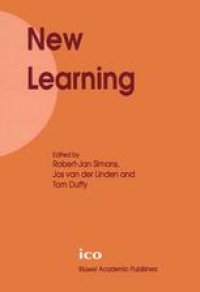
Ebook: New Learning
- Tags: Psychology general, Learning & Instruction, Cognitive Psychology, Personality & Social Psychology, Artificial Intelligence (incl. Robotics)
- Year: 2002
- Publisher: Springer Netherlands
- Edition: 1
- Language: English
- pdf
The book you are now reading aims to bring together research and theory on "new learning, "which is te term used to refer to the new learning outcomes, new kinds of learning processes, and new instructional methods both wanted by society and currently stressed in psychological and educational theory. Many people keep asking about “new learning.” Is it really a new way of learning? Are there really new learning outcomes? Is this current fad really different from the other kinds of learning propagated by such traditional school innovators as Montessori, Dewey, Steiner, or Freinet? Of course, there are some similarities between the attention now being paid to new ways of learning and new learning outcomes and previous efforts. We believe, however, that at least three important differences exist. First, there is much more attention to the role of active, independent, and self-directed learning than before. Many more schools and teachers are involved in such efforts than in the twenties or the sixties, for example. Many governments are stimulating active ways to learn. Employers and employee organizations are — for various reasons — now in favor of active learning in school and on the job. This is clearly related to increased recognition of the importance of and need for life-long learning and what are now called “learning organizations” as a result of rapidly changing societies and economies.
This book aims to bring together research and theory about `New Learning', the term we use for new learning outcomes, new kinds of learning processes and new instructional methods that are both wanted by society and stressed in psychological theory in many countries at present. Some people keep asking questions about this title. Is there really a new way of learning? Are there really new learning outcomes? Is this `fad' really different from previous waves of interest for other kinds of learning, like the ones proposed by the so-called traditional school innovators such as Montessori, Dewey, Steiner and Freinet? Of course, there is a lot of resemblance between the present attention to new ways to learn and new learning outcomes and previous ones. The book describes and illustrates the differences as well as the modern versions of the traditional innovative ideas.
This book aims to bring together research and theory about `New Learning', the term we use for new learning outcomes, new kinds of learning processes and new instructional methods that are both wanted by society and stressed in psychological theory in many countries at present. Some people keep asking questions about this title. Is there really a new way of learning? Are there really new learning outcomes? Is this `fad' really different from previous waves of interest for other kinds of learning, like the ones proposed by the so-called traditional school innovators such as Montessori, Dewey, Steiner and Freinet? Of course, there is a lot of resemblance between the present attention to new ways to learn and new learning outcomes and previous ones. The book describes and illustrates the differences as well as the modern versions of the traditional innovative ideas.
Content:
Front Matter....Pages i-viii
New Learning: Three Ways to Learn in a New Balance....Pages 1-20
Active Learning: Self-directed Learning and Independent Work....Pages 21-36
Collaborative Learning....Pages 37-54
New Technologies....Pages 55-81
Assessing Active Self-directed Learning....Pages 83-99
Valid Classroom Assessment of Complex Skills....Pages 101-118
New Learning in Science and Technology....Pages 119-140
New Learning in Social Studies....Pages 141-156
Writing and Learning to Write: A Double Challenge....Pages 157-189
A Social Perspective on New Learning....Pages 191-208
Process-oriented Teaching....Pages 209-225
Teaching for Active Learning....Pages 227-242
New Learning in Teacher Education....Pages 243-259
The Professional Development of Teachers....Pages 261-274
Back Matter....Pages 275-279
This book aims to bring together research and theory about `New Learning', the term we use for new learning outcomes, new kinds of learning processes and new instructional methods that are both wanted by society and stressed in psychological theory in many countries at present. Some people keep asking questions about this title. Is there really a new way of learning? Are there really new learning outcomes? Is this `fad' really different from previous waves of interest for other kinds of learning, like the ones proposed by the so-called traditional school innovators such as Montessori, Dewey, Steiner and Freinet? Of course, there is a lot of resemblance between the present attention to new ways to learn and new learning outcomes and previous ones. The book describes and illustrates the differences as well as the modern versions of the traditional innovative ideas.
Content:
Front Matter....Pages i-viii
New Learning: Three Ways to Learn in a New Balance....Pages 1-20
Active Learning: Self-directed Learning and Independent Work....Pages 21-36
Collaborative Learning....Pages 37-54
New Technologies....Pages 55-81
Assessing Active Self-directed Learning....Pages 83-99
Valid Classroom Assessment of Complex Skills....Pages 101-118
New Learning in Science and Technology....Pages 119-140
New Learning in Social Studies....Pages 141-156
Writing and Learning to Write: A Double Challenge....Pages 157-189
A Social Perspective on New Learning....Pages 191-208
Process-oriented Teaching....Pages 209-225
Teaching for Active Learning....Pages 227-242
New Learning in Teacher Education....Pages 243-259
The Professional Development of Teachers....Pages 261-274
Back Matter....Pages 275-279
....